
8 Simple Exercises for Heart Health—No Equipment Needed
Medically reviewed on July 20, 2022 by Jordan Stachel, M.S., RDN, CPT. To give you technically accurate, evidence-based information, content published on the Everlywell blog is reviewed by credentialed professionals with expertise in medical and bioscience fields.
For many people who work desk jobs, a typical workday involves a whopping eight hours (or more!) of sitting at a desk—broken up with the occasional coffee run, power walk to lunch, or even a sprint to your next meeting. If you’re one of the millions of people working from home, you might be sitting at your desk for even longer. This sedentary behavior, often devoid of cardiovascular exercise, can have negative effects on heart health.
With remote work here to stay, new health risks are a concern. Experts expect to see an increase in sedentary behavior as professionals choose to stay remote, and living a sedentary lifestyle can increase your risk of chronic conditions like heart disease, the leading cause of death for both men and women in the United States.
So, how can you keep your heart healthy while working from home? Regular movement, including flexibility exercise and stretching, can help mitigate the risks associated with long hours at the desk. Read on or skip to our infographic to discover eight simple heart-healthy desk exercises that can strengthen both your heart and body while you work. If you're curious about the benefits of physical activity, these exercises are designed to boost your heart health without leaving your workspace.
Table of Contents
- What Types of Exercises Improve Heart Health?
- 8 Heart-healthy Exercises
- Other Ways to Keep Your Heart Healthy
- Related content
What Types of Exercises Improve Heart Health?
There are several benefits to living an active lifestyle. Being active can help improve how you think, feel, and sleep. Plus, it can make you feel more energized, allow you to perform daily tasks more easily, and significantly enhance your cardiovascular health. If you've found yourself becoming sedentary in your work-from-home routine, the first step to reducing your risk of heart disease is to sit less and move more.
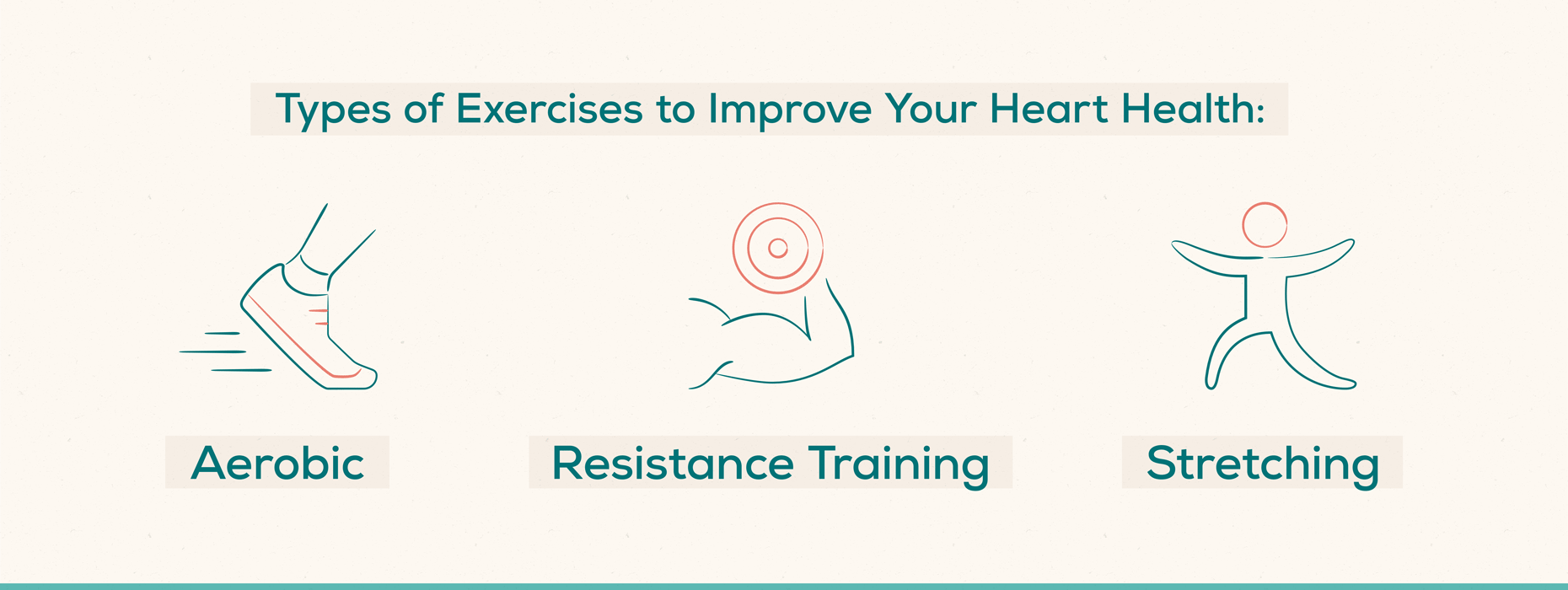
While there are many ways to move your body, we’ve listed the most important types of exercises to improve your heart health below. Keep in mind that it’s always best to speak with your healthcare provider before committing to an increase in physical activity.
Aerobic and Cardio
By definition, aerobic means “requiring oxygen.” Aerobic exercises are a type of cardiovascular (or “cardio”) conditioning aimed to increase your breathing and heart rate. This could include activities like brisk walking, jumping rope, running, dancing, or cycling. Since aerobic exercise improves circulation, it lowers blood pressure and resting heart rate over time, improving your overall heart health.
The Department of Health and Human Services (DHHS) Physical Activity Guidelines recommend that adults do at least 150–300 minutes of moderate-intensity or 75–150 minutes of vigorous-intensity aerobic exercise every week. To help differentiate between the two, think of moderate intensity as an exercise you can talk through while doing it, and vigorous-intensity exercise as an activity where you can’t say more than a few words without pausing for a breath.
Stretching
Basic stretching improves flexibility, which can benefit your musculoskeletal health and allow you to perform and recover from the exercises that improve your heart. Stretching also helps you maintain your balance and can limit your risk of injury when exercising. Ideally, you should stretch every day both before and after exercising.
Resistance Training
Resistance training is any exercise that causes your muscles to contract to increase your strength or endurance. With resistance training, you can use weights, resistance bands, or your body weight to build muscle. Resistance work in combination with aerobic exercise may also raise HDL (good) cholesterol and lower LDL (bad) cholesterol, which can reduce your risk of heart disease.
The DHHS Physical Activity Guidelines recommend that adults perform muscle-strengthening activities two or more days a week. However, it’s important to let your muscles recover for a day or two between sessions.
8 Heart-healthy Desk Exercises
1. Neck Stretch
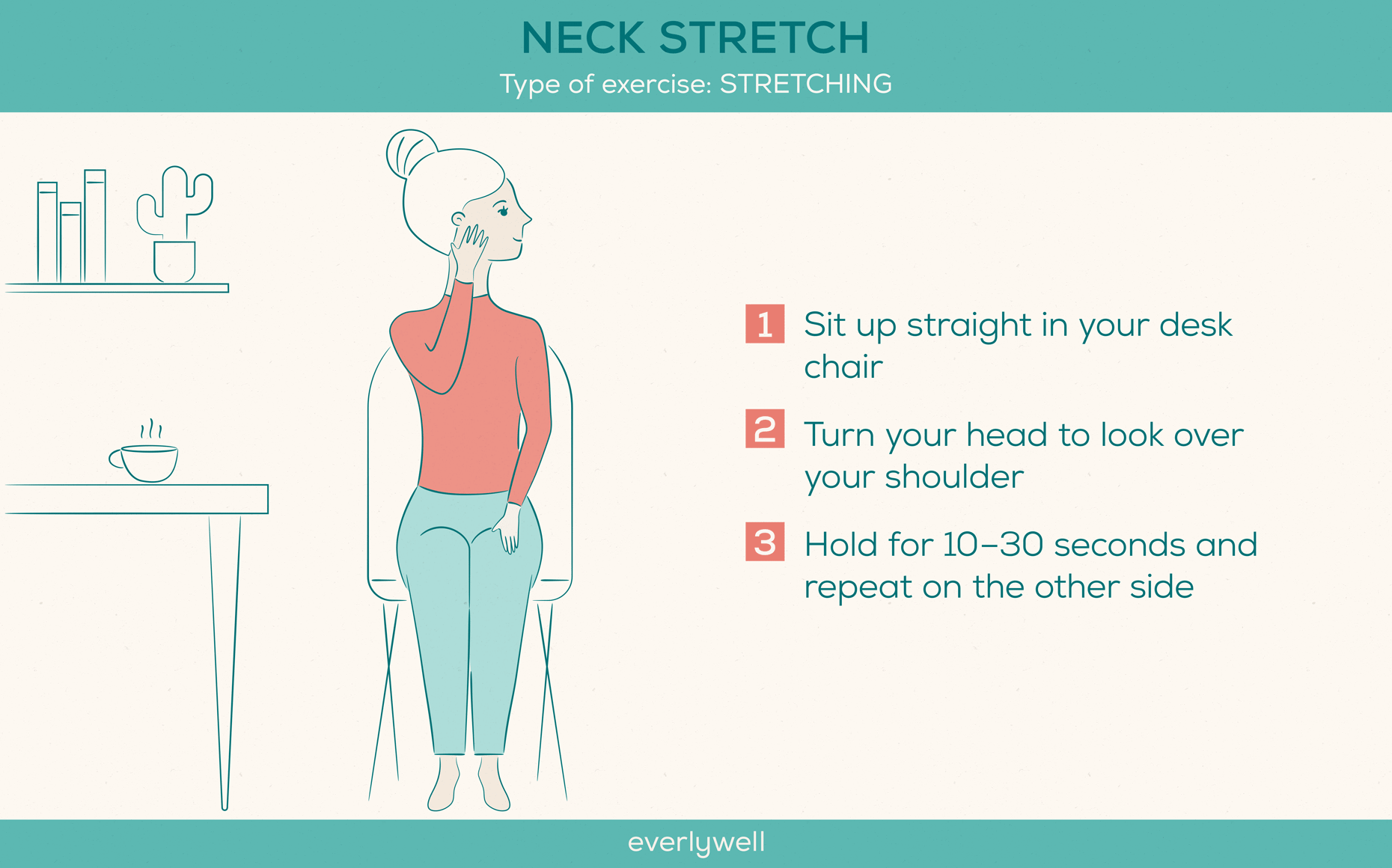
Type of exercise: Stretching
Benefits: This exercise can maintain or improve the range of motion in your neck and may relieve stiffness caused by sitting all day or having poor posture.
How to do it: A neck stretch is a great exercise to do while you work. While keeping your back against your desk chair, simply turn your head to look over your shoulder. Hold this position for 10–30 seconds and repeat on the other side.
Duration: Perform this movement 6–8 times on each side. Rest, then do a second set.
2. Desk Dips
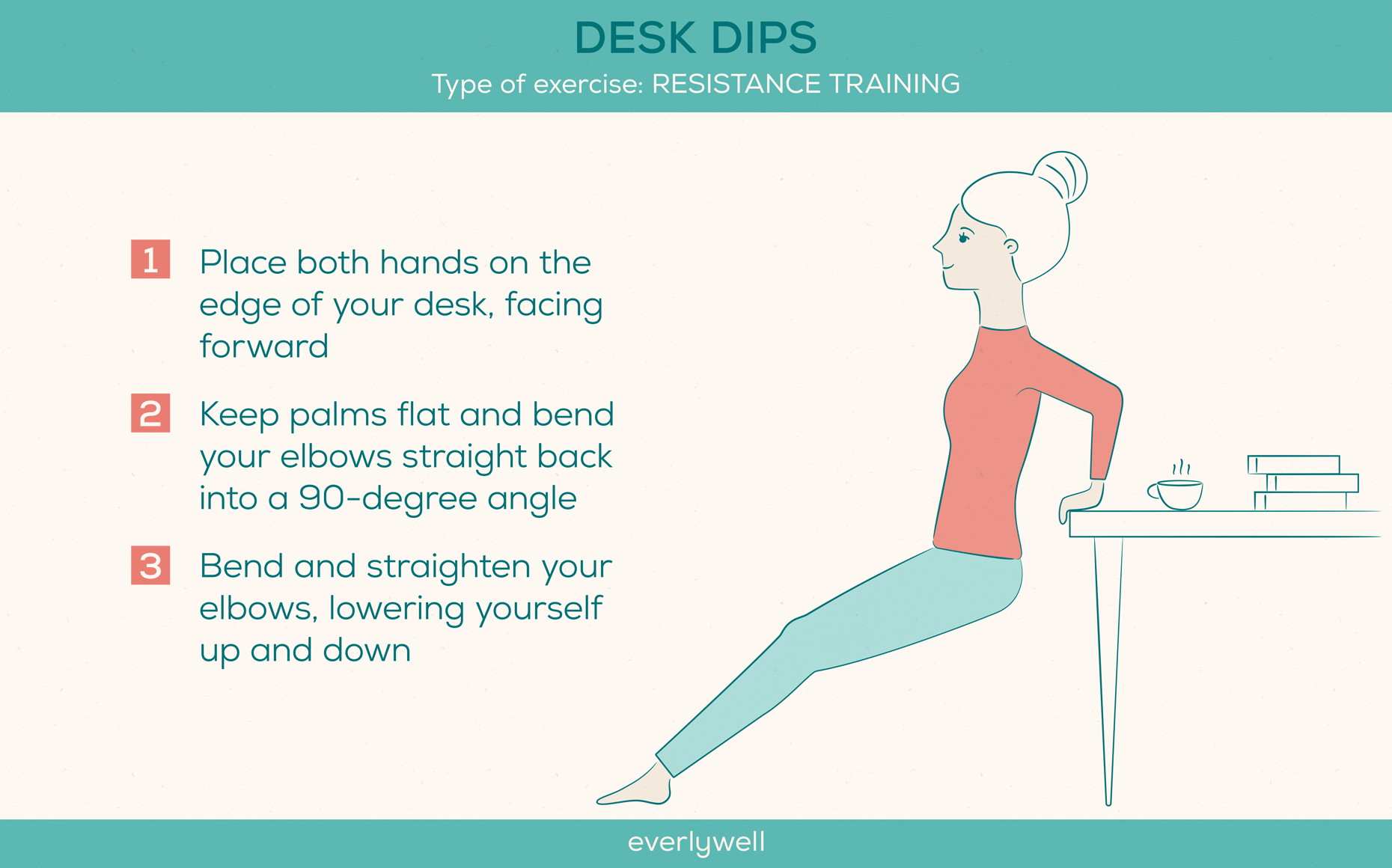
Type of exercise: Resistance training
Benefits: This exercise engages the tricep muscles and core.
How to do it: As the name suggests, a desk dip (or a tricep dip) can be done using a secure, stable desk. To do this, place both of your hands facing forward on the edge of your desk. Keep your palms flat on the desk and bend your elbow straight back to a 90-degree angle. Lower yourself up and down by bending and straightening your elbows.
Duration: Complete 20 dips.
3. Torso Twist
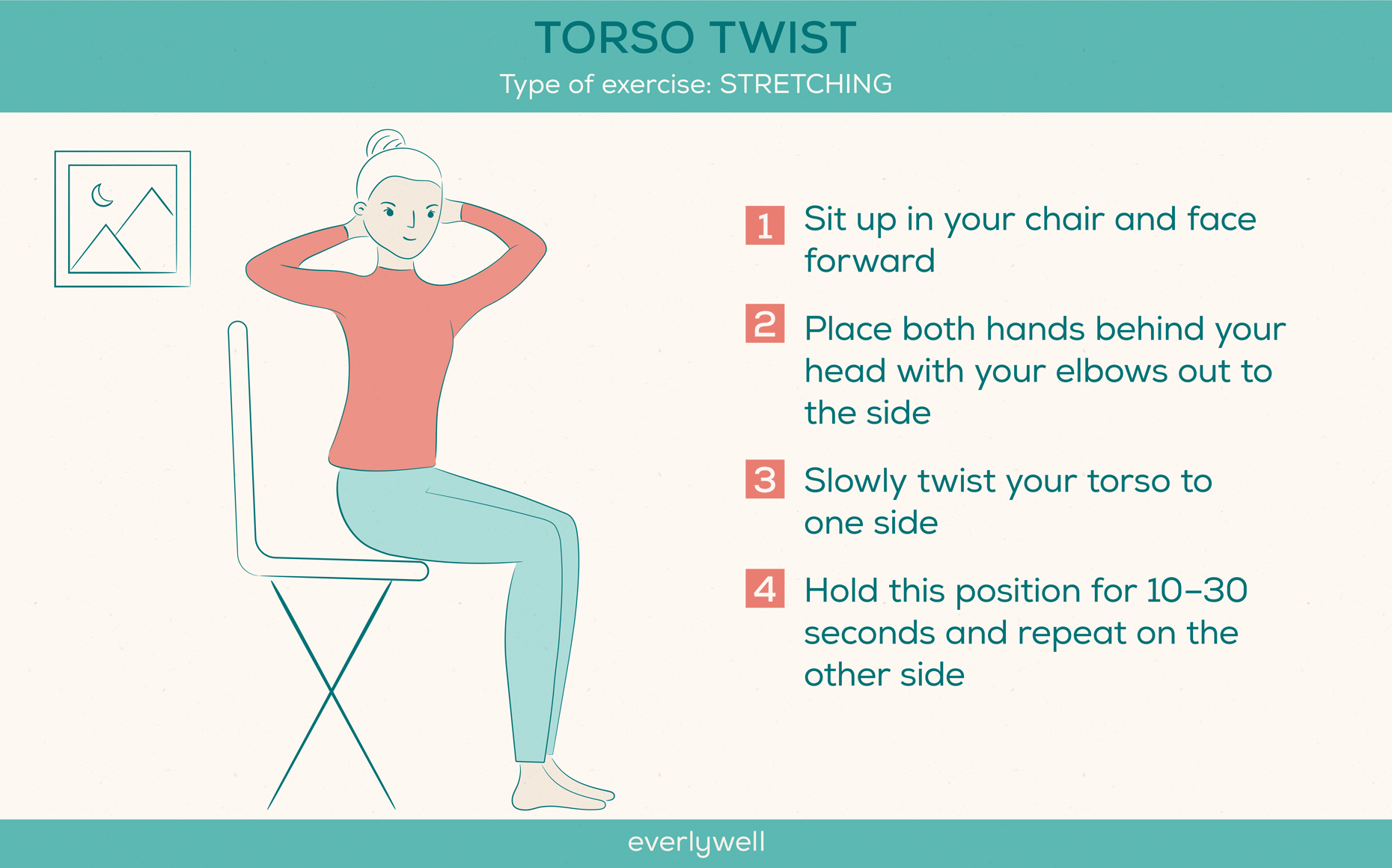
Type of exercise: Stretching
Benefits: This exercise helps maintain or improve the range of motion in your torso and activates your core muscles to help stabilize your spine.
How to do it: While sitting up and facing forward in your desk chair, place both hands behind your head with your elbows out to the side. Keep your head and hands in place then slowly twist your body to one side so you face the side wall. Make sure you are twisting from your waist without moving your hips. Hold this position for 10–30 seconds and repeat on the other side.
Duration: Perform this movement 6–8 times on each side. Rest, then do a second set.
4. Leg Raises
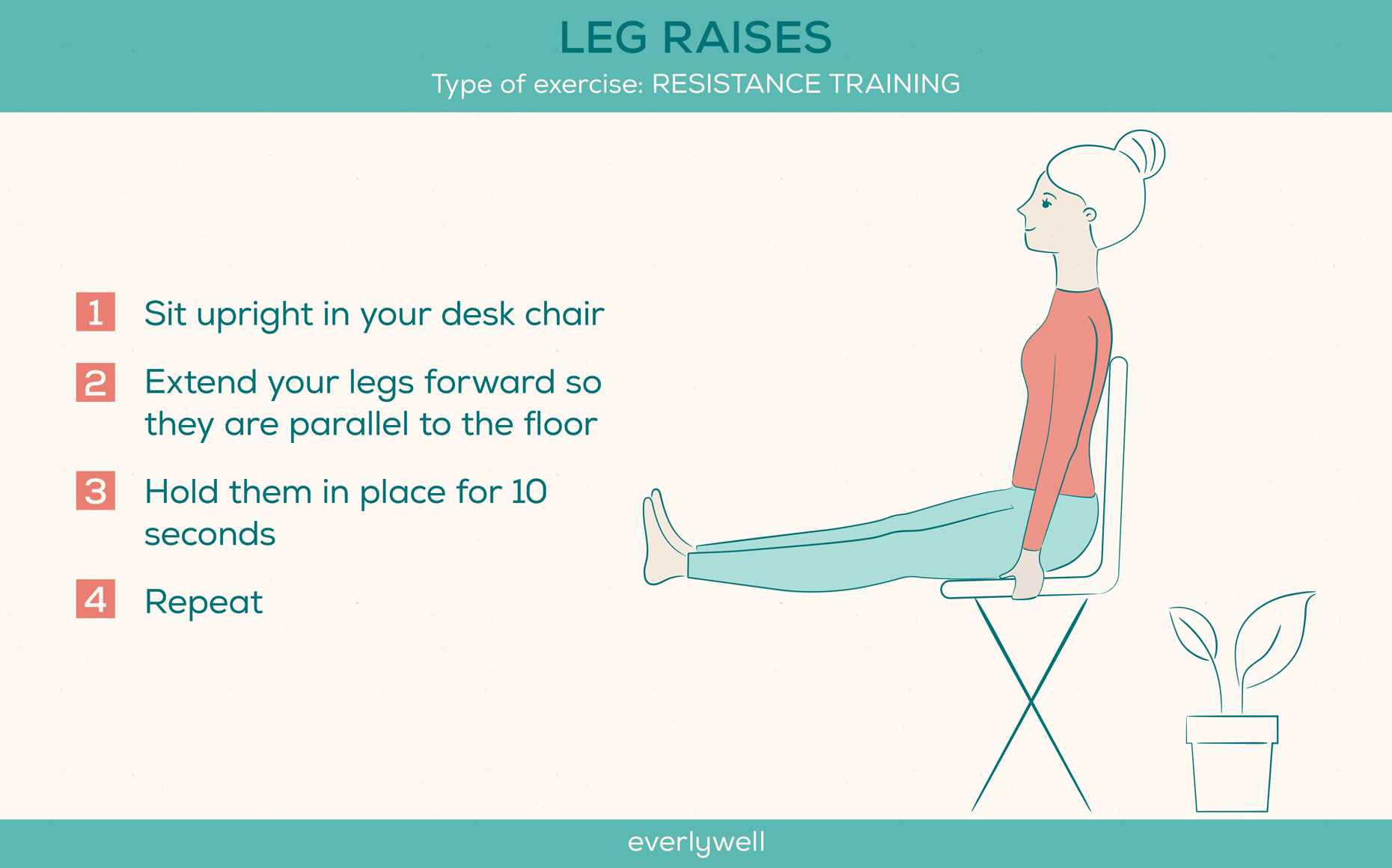
Type exercise: Resistance training
Benefits: This exercise targets your quadriceps (front of your thighs), hamstrings, and glutes.
How to do it: With leg raises, you can get a great workout without ever getting up. Sit upright in your desk chair, facing forward. Straighten out your legs so that they’re parallel to the floor and hold them in place for 10 seconds, then repeat.
Duration: Complete 15 leg raises
5. Chair Squats
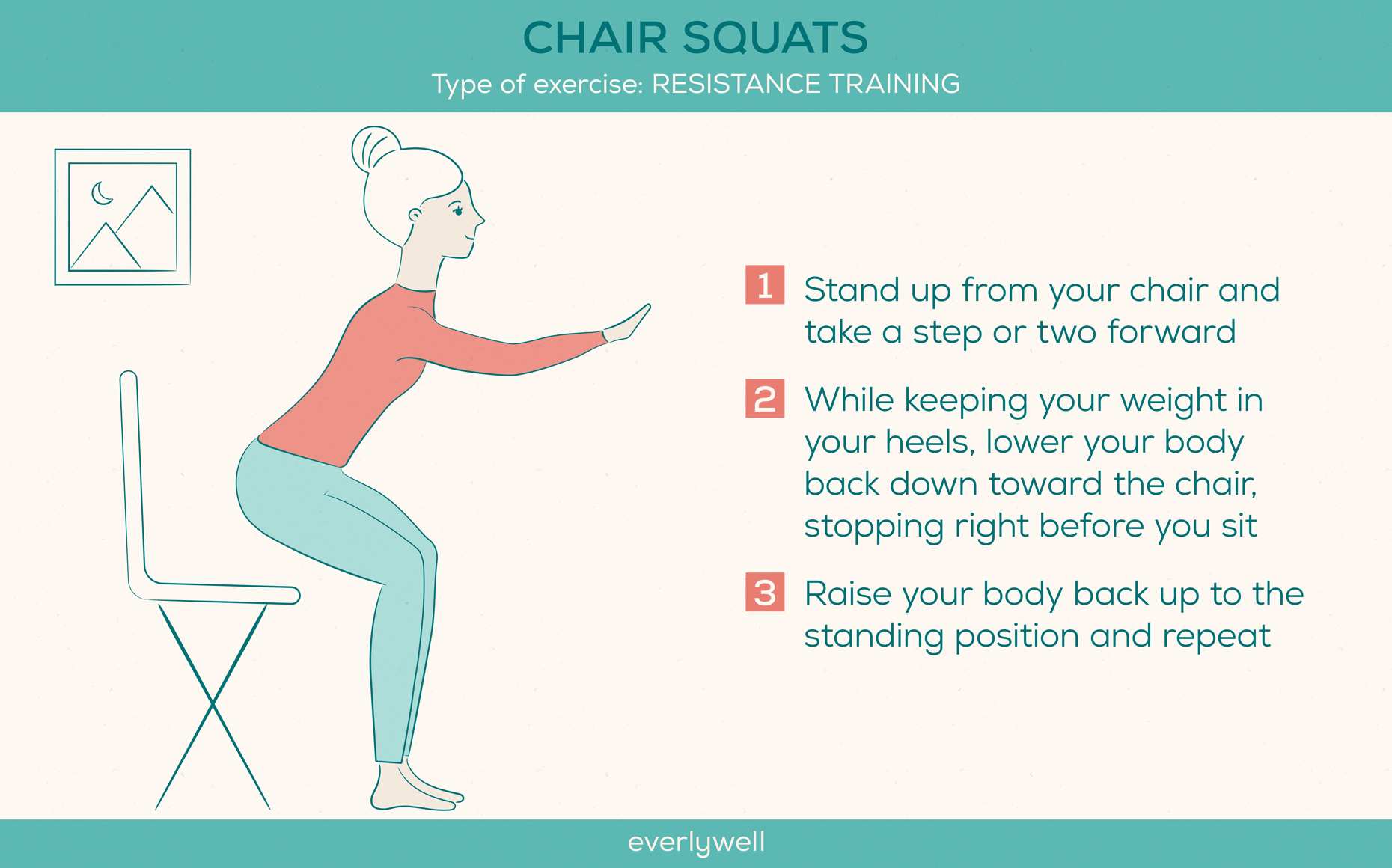
Type of exercise: Resistance training
Benefits: This exercise targets your quadriceps, hamstrings, glutes, and core muscles.
How to do it: This exercise targets your lower body. To do it, stand up from your chair and take a step or two forward. Stand up straight, keep your weight in your heels, then lower your body back down, stopping right before you sit. Return to standing position and repeat the movement.
Duration: Complete 10 chair squats, then try another set
6. Desk push-ups
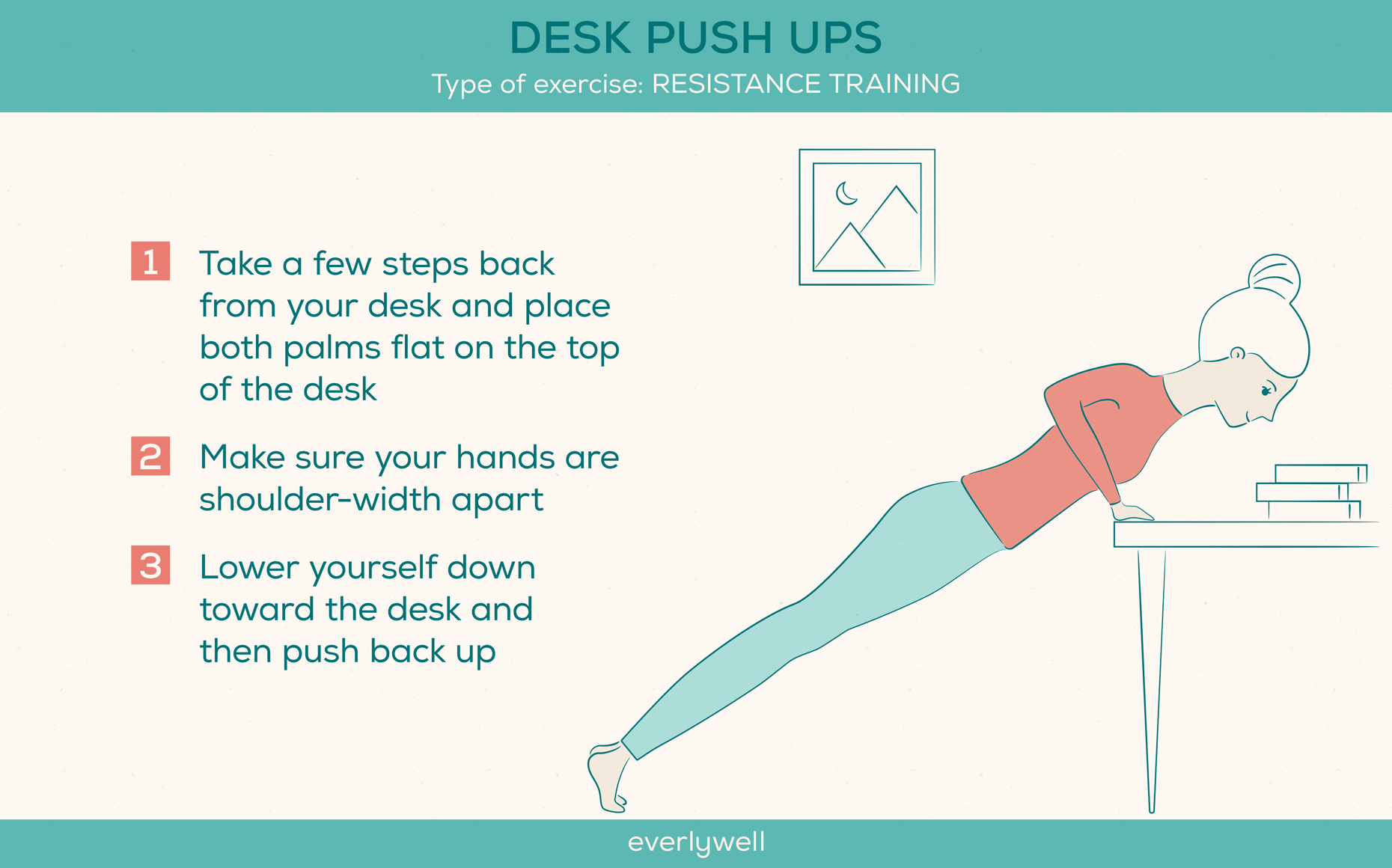
Type of exercise: Resistance training
Benefits: This exercise targets your chest, shoulders, triceps, and core.
How to do it: First, make sure your desk is sturdy enough to hold your body weight. Then, take a few steps back and put both palms flat on the front of your desk, while making sure they are shoulder-width apart. Lower yourself toward your desk and then push back up.
Duration: Complete 20 push-ups.
7. Jumping Jacks
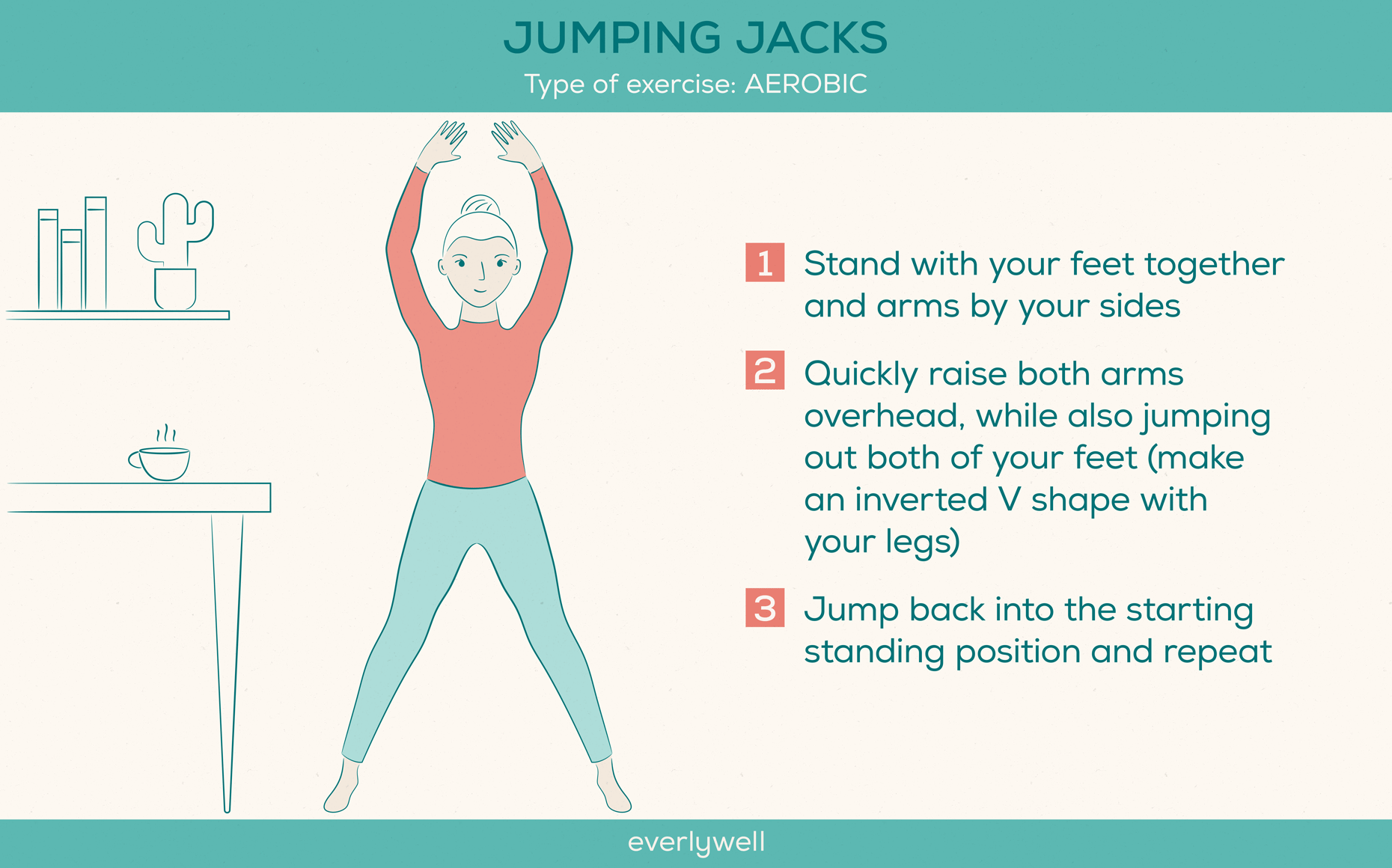
Type of heart healthy exercise: Aerobic
Benefits: This and other aerobic exercises promote increased circulation. When performed regularly, they can also help lower blood pressure.
How to do it: Start by standing up straight with your feet together and arms by your sides. Then quickly raise both arms overhead while jumping both of your feet out to the sides, making an inverted V shape with your legs. Jump back into the starting position and repeat.
Duration: Complete 30 jumping jacks.
8. Lunges
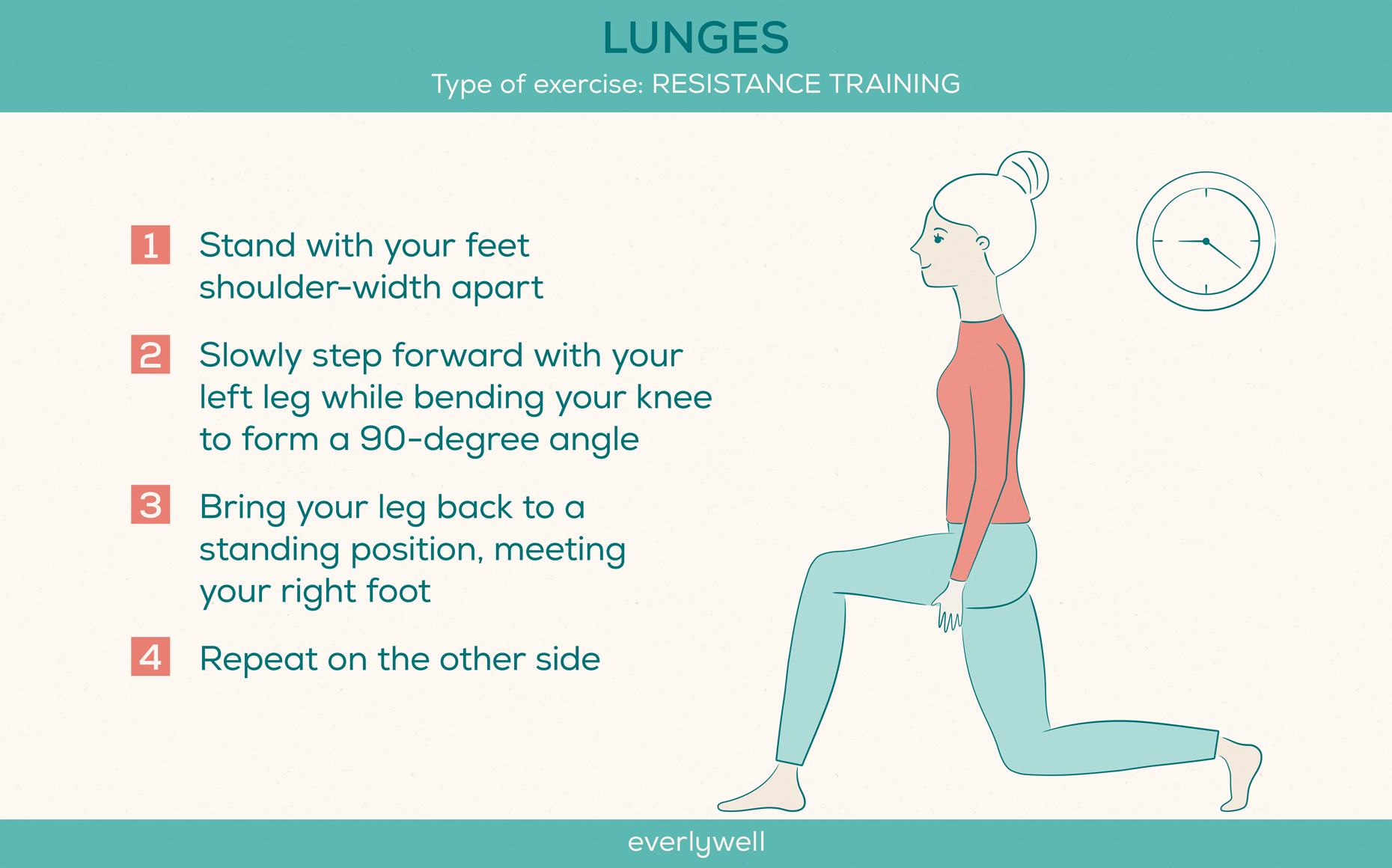
Type of exercise: Resistance training
Benefits: This exercise targets your abdominals, lower back, glutes, quadriceps, hamstrings, and calves.
How to do it: For this exercise, you’ll have to find a spot next to your desk with enough space to move. Start by standing with your feet shoulder-width apart and slowly step forward with your left leg while bending your knee to form a 90-degree angle. Then, slowly bring your left leg back to a standing position, meeting your right foot. Repeat on the right side.
Duration: Complete 5–15 reps, then switch legs.
Other Ways to Keep Your Heart Healthy
Everyone is at risk of heart disease, and 1 in 4 deaths are attributed to heart disease each year in the U.S. Luckily, in addition to staying active, there are a few things you can do to keep your heart healthy and mitigate your risk of developing heart disease.
- Maintain a balanced diet [8]: Eat heart-healthy foods like fruits, vegetables, whole grains, nuts, legumes, and healthy proteins while avoiding processed foods, added sugars, and excess salt.
- Sit less and move more: Engaging in regular exercise, like brisk walking or other cardio exercises, improves blood flow and overall cardiovascular fitness.
- Maintain a healthy weight: Keeping a healthy weight can lower high blood pressure and reduce the risk of heart attack.
- Quit smoking and avoid secondhand smoke: Smoking is a major risk factor for heart attack, as it harms blood flow and can lead to cardiovascular complications. Quitting can yield immediate benefits, helping to improve heart condition.
- Monitor your blood pressure:Maintaining a target heart rate during exercise helps monitor and manage blood pressure effectively.
- Drink alcohol only in moderation: Drinking in moderation can support a healthy heart and reduce the risk of cardiovascular complications.
- Manage stress[10]: Stress management is vital for heart health because chronic stress can raise blood pressure and increase the risk of cardiovascular disease. Regular exercise and good sleep are effective ways to manage stress, contributing to improved mental health. Explore the symptoms of high cortisol levels to understand its impact on your body.
- Get a good night sleep[10]: Adequate sleep is essential for a healthy heart. Adults should aim for 7-9 hours of sleep each night to reduce the risk of high blood pressure, elevated LDL levels, and other heart conditions.
- Regularly measure your cholesterol levels: Keeping track of cholesterol levels can help prevent heart conditions by allowing you to adjust your lifestyle as needed.
Approximately 80% of U.S. adults and adolescents are insufficiently active, and remote work has only made it more difficult to keep your body moving. Staying active from home can be a challenge, but it’s definitely possible. If you have any concerns about your heart health, consider taking an at-home Heart Health Test or Cholesterol and Lipids Test to monitor your risk of chronic heart conditions.
These tests, as well as the HbA1c Test, are also available to you when you join the Everlywell+ at-home heart health membership.
Related content
How to keep your heart healthy: key points to know
How you can improve heart health: 7 tips
Article Sources:
- Heart Disease Facts. Centers for Disease Control and Prevention. URL. Accessed June 21, 2022.
- American Heart Association Recommendations for Physical Activity in Adults and Kids. American Heart Association. URL. Accessed June 21, 2022.
- 3 Kinds of Exercise That Boost Heart Health. Johns Hopkins Medicine. URL. Accessed June 21, 2022.
- The Physical Activity Guidelines for Americans. JAMA Network. URL. Accessed June 21, 2022.
- Differential Effects of Aerobic Exercise, Resistance Training and Combined Exercise Modalities on Cholesterol and the Lipid Profile: Review, Synthesis and Recommendations. National Center for Biotechnology Information. URL. Accessed June 21, 2022.
- Does Exercise Lower Cholesterol? Cleveland Clinic. URL. Accessed June 21, 2022.
- Sleep plays an important role in heart health. The American Heart Association. URL. Accessed February 15, 2022.
- Heart Healthy Foods. Cleveland Clinic. URL. Accessed June 27, 2022.
- How Smoking Affects Heart Health. FDA. URL. Accessed February 15, 2022.
- Stress and Heart Health. The American Heart Association. URL. Accessed February 15, 2022.
Jordan Stachel, M.S., RDN, CPT is most fulfilled when guiding others towards making stepwise, sustainable changes that add up to big results over time. Jordan works with a wide variety of individuals, ranging in age from children to the elderly, with an assortment of concerns and clinical conditions, and has written for publications such as Innerbody. She helps individuals optimize overall health and/or manage disease states using personalized medical nutrition therapy techniques.
